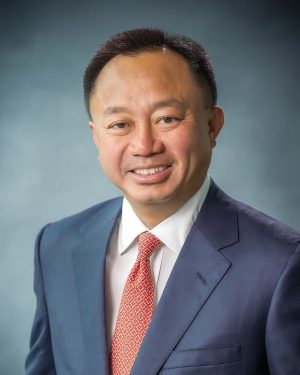
Viet Dinh (courtesy of Bancroft)
The biggest Biglaw news from yesterday — and most likely the week — is Kirkland & Ellis hiring all 17 lawyers of Bancroft PLLC. Named for Bancroft Place, the street in D.C. where it had its first office, Bancroft is the super-elite boutique founded in 2003 by former assistant attorney general Viet Dinh and joined in 2011 by former solicitor general Paul Clement.
Over its 13 years, Bancroft became known for its top-flight Supreme Court and appellate practice, handling high-profile, hot-button cases such as challenges to aspects of Obamacare and defense of the Defense of Marriage Act (which is what led Clement to join Bancroft from King & Spalding five years ago, after defending DOMA proved too hot for K&S to handle).
In a series of updates to our original story, we quoted prominent in-house lawyers reacting positively to the news. It seems that Clement’s fellow SCOTUS advocates feel the same way, per Law.com:
“It was a shock. Nobody was expecting this,” said Lisa Blatt, head of Arnold & Porter’s Supreme Court practice and a longtime friend of Clement’s. “This is the biggest shakeup in the Supreme Court bar since Paul left King & Spalding in 2011.”
Neal Katyal, a former acting U.S. solicitor general, said that hire of Clement, Dinh and their team was a “huge coup for Kirkland.”
As Sidley & Austin chair Carter Phillips told Am Law Daily, “If Kirkland’s desire is to become a top-tier player, there is no more visible way to accomplish it than Paul.”
We noted (again in updates to our earlier story) that the deal came together in a matter of weeks, with Kirkland partner Mark Filip, a member of K&E’s Global Management Executive Committee, playing a major role. According to Big Law Business, the deal came together in just two weeks, initiated by an informal call by Filip to Clement (so presumably no legal recruiter made a killing on this mass lateral hire).

Humans in the Loop: The People Powering Trusted Legal AI
As the use of artificial intelligence permeates legal practice, a critical question confronts every legal professional who uses these tools: Can I trust this?
How much might Clement and Dinh earn at Kirkland? A lot. They’ve declined to discuss specifics, of course, but Dinh told Big Law Business, “Suffice it to say, everybody wins here.” As noted by Big Law Business, K&E’s has deep pockets, which it happily digs into for star laterals. Recall, for example, the $5 million annual pay package it gave to former SEC enforcement director Robert Khuzami. That amount happens to be what Clement earned at King & Spalding back in the day, so he’s probably getting something north of that from Kirkland.
Earlier this afternoon, I chatted with Viet Dinh about his firm’s lawyers moving over to Kirkland. Here’s a (lightly edited and condensed) write-up of our conversation.
DL: Congratulations on the big news!
VD: Thank you. We’re very excited. [My wife] Jennifer and I had a baby girl in August, so it has been a big summer. I gained a baby — and 1,700 colleagues!
DL: It’s great news, in many ways. But are there things you’ll miss about Bancroft or having your own firm?
VD: There’s a little of a bittersweet sense to yesterday. We developed a pretty good thing at Bancroft, establishing through the marketplace that we can do quality work, handle interesting cases, and be financially successful. We hope to continue that momentum at Kirkland. I think of this not as changing highways or even lanes, but as putting more gas or octane into the car so we can go even faster.
DL: Bancroft was a small and super-elite firm. Its lawyers have had 120 Supreme Court arguments, and during its 13 years, it sent nine of its lawyers into high court clerkships. Kirkland is an amazing firm, to be sure, but it’s also huge. How do you anticipate the Bancroft lawyers operating within Kirkland? Will you perhaps be a group unto yourselves?
VD: On day one, I don’t think much changes except the location where we do our work, the letterhead, and our email addresses. We are fully utilized; we’re not going to Kirkland because we need more work, and they’re not absorbing us to find work for themselves either. Obviously as we continue to grow and get the benefit of the larger Kirkland platform, there will be more opportunities for our younger lawyers to work with their new K&E colleagues, and opportunities for K&E lawyers to work with our group. So we envision a gradual and meaningful integration process. Kirkland is best of class in a number of practice areas — trial litigation, restructuring, private equity — and they know how to treat best-in-class practices. We look forward to sharing in this commonality of excellence.
DL: Kirkland already has a strong appellate and Supreme Court practice, under the leadership of Chris Landau. How will your and Paul’s arrival affect that practice? Will either of you be taking a leadership role in either the appellate practice or Kirkland more generally, such as on the management executive committee?
VD: The short answer is no. Kirkland doesn’t have many substructures, and Paul and I trust Mark [Filip] as much as we trust each other. We are very happy to be guided by Mark and his colleagues on the management committee.
As for the appellate practice, Kirkland’s lawyers — including Chris, John O’Quinn, and Pat Philbin — are all folks we know and respect, and they’re doing some of the best Supreme Court and appellate work out there. Together with them, we hope to do more of what we love doing: winning cases and serving clients.
DL: Kirkland is a larger firm than Bancroft by a factor of about 100, and it has many more clients. Did you evaluate potential client conflicts before making this move, and if so, what did your analysis show?
VD: We did a thorough conflicts analysis, running conflicts checks for the two systems, and found surprisingly little conflict. We had almost no breakage; we were able to resolve the issues that arose. At a deeper level, we’re very happy with the full and frank conversation we had with Kirkland about resolving conflicts.
DL: Bancroft handles lots of major, controversial cases before the Court. Kirkland is a large global law firm with many lawyers and clients. You’re not worried about a possible “DOMA 2”-type situation?
VD: We want to protect our ability to do interesting work, and Kirkland not only supports that but very much appreciates our specialized docket. Conflicts, soft or hard, will inevitably arise; it’s the law of large numbers, and the result of more lawyers doing important work. The question is not whether there will be conflicts but how they get resolved. We’re very comfortable with the discussions we’ve had with Kirkland about flagging conflicts and our plan to resolve them going forward.
DL: Some sources of ours at Kirkland have expressed concern that the absorption of the Bancroft attorneys, who represent major conservative causes, will create conflicts or otherwise prevent K&E from handling progressive pro bono work, like its voting rights work against North Carolina. Any concerns?
VD: I don’t think so. I haven’t focused much on that issue as opposed to our own issues, but we anticipate that we will be able to continue representing a broad array of clients. Earlier this year, Paul won a big case on behalf of the Omaha Tribe. No matter where one falls on the political spectrum, one can respect that case and Paul’s advocacy as a win for the Court’s jurisprudence.
DL: Was the move to Kirkland motivated in part by the issue of succession planning? Both you and Paul have served in high government posts, and you might do so again in the future (even if not in a Trump Administration). Is going to Kirkland a way of ensuring that everyone at Bancroft has a long career runway?
VD: Succession planning, at least in the short term, was not a big concern. All of us love what we do and intend to do it for a long, long time. There was no immediate sense of “what happens to the firm if x or y or z.”
But in terms of the bigger picture, the deal would make sense only if it was a win for everyone at the firm, from the most junior staff member to the most senior partner. The animating spirit for the transaction was enhancing opportunities for everyone, both for firm leaders and for our junior colleagues.
DL: I wonder if it’s hard out here for a boutique. Over the years, D.C. has had some great boutiques — during my clerkship, I interviewed with one of them, Miller Cassidy — but many of them get absorbed into larger firms, like how Miller Cassidy got absorbed into Baker Botts.
It’s challenging for boutiques on two fronts, it seems to me. First, they have to compete with larger firms for clients and matters. Second, assuming they do successfully compete, then Biglaw comes calling and makes them an offer they can’t refuse. Is it possible for boutiques to make it work?
VD: For certain cases, clients will always go to the best lawyer and best practice they can find, whether in a boutique platform or a Biglaw platform or even in a kiosk of one or two lawyers. The clients will find the lawyer who will best serve their needs.
I do think that there’s something to be said about this transaction building strength on strength. We felt our ability to do even more of what we love will be enhanced at Kirkland. We could have gotten there organically on our own, but having this kind of opportunity, platform, and match of cultures just made the whole deal very easy.
DL: That makes perfect sense. Congratulations again, and thanks for taking the time to chat!
How the SCOTUS Firm Conservatives Love Got Acquired by Kirkland (in Two Weeks!) [Big Law Business]
How Bancroft Found a New Home at Kirkland [Am Law Daily]
Kirkland Acquires DC-Based Boutique Bancroft [American Lawyer]
Kirkland & Ellis to Absorb Bancroft [Wall Street Journal]
Kirkland & Ellis acquires Bancroft, home to famed Supreme Court advocate Paul Clement [ABA Journal]
Earlier: Kirkland & Ellis Hires Paul Clement, Viet Dinh — And All Of Bancroft’s Lawyers!
David Lat is the founder and managing editor of Above the Law and the author of Supreme Ambitions: A Novel. You can connect with David on Twitter (@DavidLat), LinkedIn, and Facebook, and you can reach him by email at [email protected].
